Featured
 A GOP war on ‘woke’? Most Americans see term as positive: Ipsos Poll. By Susan Page / USA Today (Image Chattanooga Times Free Press)
A GOP war on ‘woke’? Most Americans see term as positive: Ipsos Poll. By Susan Page / USA Today (Image Chattanooga Times Free Press)
By 56%-39%, Americans say ‘woke’ means being aware of social injustice, not being overly politically correct.
Republican presidential hopefuls are vowing to wage a war on “woke,” but a new USA TODAY/Ipsos Poll finds a majority of Americans are inclined to see the word as a positive attribute, not a negative one. Fifty-six percent of those surveyed say the term means “to be informed, educated on, and aware of social injustices.” That includes not only three-fourths of Democrats but also more than a third of Republicans. Overall, 39% say instead that the word reflects what has become the GOP political definition, “to be overly politically correct and police others’ words.” That’s the view of 56% of Republicans. Read more
Related: How ‘Woke’ Became an Insult. By john McWhorter / NYT
Political / Social
 “We need a 20-year plan”: The fight for progress — and why it requires reaching out to conservatives. By Chauncey Devega / Salon
“We need a 20-year plan”: The fight for progress — and why it requires reaching out to conservatives. By Chauncey Devega / Salon
Author Justin Gest on why Americans need to start communicating with one another again
America is very broken. Language like “divided” does not even begin to adequately describe the feeling of wrongness that the Age of Trump and his fascist fever dream have unleashed. Social scientists and others have shown that Americans are self-segregating along lines of partisanship and other political values. These questions of political identity are increasingly not peaceful or civil. In an attempt to work through these questions, I recently spoke with Justin Gest, an associate professor at George Mason University’s Schar School of Policy and Government. He is the author of several books including The New Minority: White Working Class Politics in an Age of Immigration and Inequality and The White Working Class: What Everyone Needs to Know. His new book is Majority Minority. Read more
 First Gen Z Congressman Shreds Ron DeSantis With 1 Damning Word. By Ben Blanchet / HuffPost
First Gen Z Congressman Shreds Ron DeSantis With 1 Damning Word. By Ben Blanchet / HuffPost
“There’s a new bill every day but we have to call it for what it is,” said Rep. Maxwell Frost (D-Fla.), who recently began his first term in Congress
Rep. Maxwell Frost (D-Fla.) criticized 2024 presidential hopeful and Florida Gov. Ron DeSantis (R) for his “fascism” as he tore up bills recently backed by the governor that take aim at Black people and members of the LGBTQ community. Frost has a history of criticizing DeSantis, who dismissed him at an event last year and said “no one wants to hear” from him after Frost called on the governor to take action on gun violence. Read more
Related: DeSantis threatens free speech protections with new defamation bill. By Kate Ruane / USA Today
 “Racist”: Trump rages at Fani Willis on Truth Social for fighting GOP crackdown on local prosecutors. By Gabriella Ferrigine / Salon
“Racist”: Trump rages at Fani Willis on Truth Social for fighting GOP crackdown on local prosecutors. By Gabriella Ferrigine / Salon
Georgia Republicans are pushing legislation to make it easier to remove local DAs. Critics say it’s retaliation
Fulton County District Attorney Fani Willis — the Georgia prosecutor investigating former President Donald Trump’s efforts to overturn his loss in the state — slammed new proposed Republican legislation targeting local prosecutors as “racist.” Two of the proposed measures in the state legislature would create an oversight board that could punish or remove local prosecutors for “willful misconduct,” among a number of other vague reasons — which critics called a thinly veiled conservative attempt to oust prosecutors deemed to be too liberal. Read more
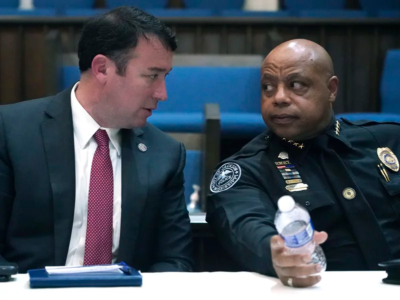 Mississippi Senate OKs police and judges bill affecting majority-Black city. By AP and NPR
Mississippi Senate OKs police and judges bill affecting majority-Black city. By AP and NPR
Mississippi Public Safety Commissioner Sean Tindell, left, confers with Jackson Police Chief James Davis during a town hall meeting to address youth crime issues in Jackson, Miss., Feb. 14, 2023.
The majority-white and Republican-led Mississippi Senate voted Tuesday to pass its version of a bill that would allow an expanded role for state police and appointed judges inside the majority-Black capital city of Jackson, which is led by Democrats. “It is vastly improved from where it started, but it is still a snake,” Democratic Sen. John Horhn of Jackson said of the bill during Tuesday’s debate. Critics say that in a state where older African Americans still remember the struggle to gain access to the ballot decades ago, the bill is a paternalistic attempt to intrude on local decision-making and voting rights in the capital, which has the highest percentage of Black residents of any major U.S. city. Read more
 Justice Dept. Finds Pattern of Discriminatory Policing in Louisville. By Glenn Thrush / NYT
Justice Dept. Finds Pattern of Discriminatory Policing in Louisville. By Glenn Thrush / NYT
The review, undertaken after a specialized unit killed Breonna Taylor in a botched raid in 2020, paints a damning portrait of a department in crisis.
The police department in Louisville, Ky., engaged in a yearslong pattern of discriminatory law enforcement practices, the Justice Department said on Wednesday after conducting a two-year investigation prompted by the fatal shooting of Breonna Taylor by the police in 2020. Attorney General Merrick B. Garland, appearing in Louisville alongside the city’s mayor and acting police chief, announced an agreement to overhaul policing practices he said had led to systemic discrimination against Black people, including Ms. Taylor. Ms. Taylor, a Black medical worker, was shot and killed by police officers assigned to a drug enforcement unit in March 2020 during a botched raid of her apartment. Read more
 The Supreme Court signals that a terrifying attack on voting rights will vanish, in Moore v. Harper. By Ian Millhiser / Vox
The Supreme Court signals that a terrifying attack on voting rights will vanish, in Moore v. Harper. By Ian Millhiser / Vox
Moore v. Harper endangers elections in the United States. Now it seems likely to disappear.
Moore v. Harper, a lawsuit the Supreme Court heard last December, poses the biggest threat to US democracy since the January 6 attack on the US Capitol — although it’s worth noting that even some of the Court’s more conservative members seemed to recoil at some of the case’s implications when they heard oral arguments in Moore in December. On Thursday, the justices signaled that they are likely to take an off-ramp from this case. The Court released a brief, one-paragraph order indicating that this case may simply disappear. Moore rests on an awkwardly named legal theory, known as the “independent state legislature doctrine,” which claims that state lawmakers have expansive and potentially unchecked authority to write election laws that favor their preferred federal candidates. Read more
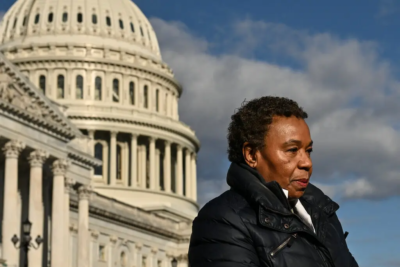 More Black Women Run for Office, but Prospects Fade the Higher They Go. By Jazmine Ulloa / NYT
More Black Women Run for Office, but Prospects Fade the Higher They Go. By Jazmine Ulloa / NYT
A Black woman has never been a governor, and only two have been senators. Despite progress at lower levels of government, and one boundary-breaking vice president, familiar barriers are slow to fall.
As Representative Barbara Lee hits the campaign trail for a Senate seat in California, significant hurdles await her. The race is expected to be one of the most competitive, and expensive, in the country. Even more daunting, she will face one of the strongest glass ceilings in American politics. Read more
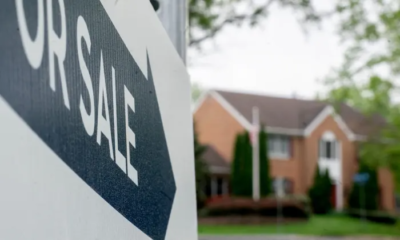 Black couple win discrimination case after their house value was lowballed. By Edwin Rios / The Guardian
Black couple win discrimination case after their house value was lowballed. By Edwin Rios / The Guardian
The case offers a glimpse into the ways housing assessments are riddled with systemic racism, exacerbating inequalities
When Paul Austin and Tenisha Tate-Austin had their home assessed by an appraiser in 2020, they learned it was worth $995,000. So the Black couple, who purchased their home in December 2016 and spent thousands in renovation costs over the years, decided to get a second opinion. They “white-washed” their property and had a white friend pose as the homeowner. Weeks later, a different appraiser assessed the house’s value at $1,482,500. The couple sued for discrimination. Read more
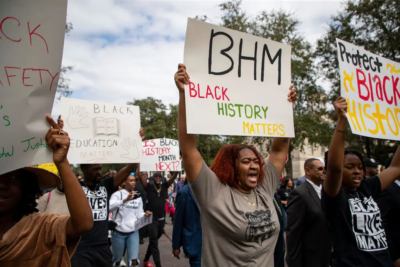 As Some States Restrict Black Studies, New York City Expands It. By Troy Closson / NYT
As Some States Restrict Black Studies, New York City Expands It. By Troy Closson / NYT
The city will launch lessons about Black and Asian Americans across more schools next year, but some students say there should be more.
The Black studies curriculum in social studies will launch in a handful of classrooms in September, before expanding across grades pre-K to 12. An Asian American and Pacific Islander curriculum, which was taught in about a dozen schools this fall, will also expand across the system in 2024. Some schools had already adopted an L.G.B.T.Q. curriculum supplement for children in fourth through twelfth grades last year. Read more
Related: Views From The Classroom On The New AP African-American Studies Course. By NPR
 Jury awards $8 million to Black family detained while grabbing coffee. By Daniel Wu / Wash Post
Jury awards $8 million to Black family detained while grabbing coffee. By Daniel Wu / Wash Post
California deputies unreasonably detained a Black family in 2019 when they stopped at a Starbucks during a road trip, jury rules
In a confrontation captured on body-camera footage, the deputy, Steven Holland, told Loggervale that he was investigating car break-ins in the area. He then asked to see Loggervale’s identification. Loggervale refused. She said she hadn’t done anything wrong and asked why she was being questioned. Holland ordered all three family members out of the car and detained them, video shows. Officers handcuffed them and held them in a patrol car without citing them for a crime. Read more
 Leading American medical journal continues to omit Black research, reinforcing a legacy of racism in medical knowledge. By Charise Escobar Jones, Gwendolyne Reid and Mya Poe / The Conversation
Leading American medical journal continues to omit Black research, reinforcing a legacy of racism in medical knowledge. By Charise Escobar Jones, Gwendolyne Reid and Mya Poe / The Conversation
The leading U.S. medical journal, read regularly by doctors of all specialties, systematically ignores an equally reputable and rigorous body of medical research that focuses on Black Americans’ health
The American Medical Association created a segregated “whites only” environment more than 100 years ago to prohibit Black physicians from joining their ranks. This exclusionary and racist policy prompted the creation in 1895 of the National Medical Association, a professional membership group that supported African American physicians and the patients they served. Today, the NMA represents more than 30,000 medical professionals. The story of the AMA and NMA is not only a reminder of the racist history of medicine. It demonstrates how the expertise of Black professionals and researchers continues to be ignored today. The lack of JNMA citations in JAMA research undercuts the AMA’s own work on racial equity and potentially compromises the quality of medical knowledge published in its journals. Read more
Ethics / Morality / Religion
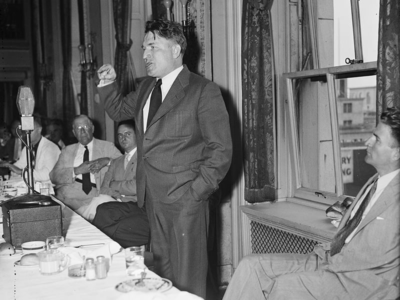 Old-school Christian nationalism’s avatar of racism, antisemitism and conspiracies. By Bob Smietana / RNS
Old-school Christian nationalism’s avatar of racism, antisemitism and conspiracies. By Bob Smietana / RNS
The early version of Christian nationalism turned the fear of communism into an excuse to embrace prejudice and forfeit American democracy. Shown is The Rev. Gerald L.K. Smith speaks against the New Deal in August 1936. Photo courtesy of the Library of Congress/Creative Commons
The Rev. Gerald L.K. Smith loved Jesus so much he built a seven-story statue on the top of an Ozark mountain to honor his savior. Smith loved America, too, but despised many of his fellow Americans. Especially those who were Black, Jewish or immigrants. An ordained Disciples of Christ pastor, master showman, skilled fundraiser, prolific writer and “minister of hate,” Smith spent decades warning white Christians that they were in danger of losing their country to devious forces conspiring against them. Read more
 What These 13 Jewish Americans Are Proud of and Afraid Of. By NYT
What These 13 Jewish Americans Are Proud of and Afraid Of. By NYT
We wanted to understand how antisemitism was affecting American Jews whose daily lives did not necessarily intersect with these high-profile incidents. How did they experience antisemitism in their lives, if at all? And what did it mean to them to be Jewish in America today?
We spoke with 13 Jewish Americans of different ages and political affiliations from across the country to learn how they connect to being Jewish, what they are scared of, what they are optimistic about and what they hope generations of American Jews will carry forward. Many of the people we spoke to expressed fear about rising antisemitism, going so far as to hide their Jewish identities in certain circumstances. Read more
 Identifying—and Challenging—Our Biases. By Anne Rulo / Christianity Today
Identifying—and Challenging—Our Biases. By Anne Rulo / Christianity Today
As a general rule, we can only do better when we know better. We only know better when we lean in, listen, reflect, and grow.
Often, other students opened up about their biases against people from different cultures, abilities, classes, political parties, or religions. My students didn’t confess these beliefs with confidence. They whispered the words, their voices heavy with the awareness that they didn’t want to feel or think this way. But they did—and so do we. We cannot live in a world so historically threaded with systemic racism, gender inequality, and political dichotomy without being affected. Bias is not innate. Instead, it comes through the powerful messages of media, culture, and our communities. Read more
Historical / Cultural
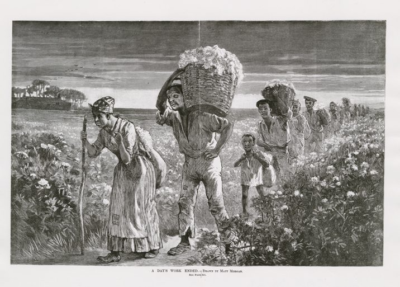 An Environmental History of Slavery: An Interview with David Silkenat. By Adam McNeil / AAIHS
An Environmental History of Slavery: An Interview with David Silkenat. By Adam McNeil / AAIHS
“A day’s work ended,” 1887 (The New York Public Library Digital Collections)
David Silkenat (DS): Scars on the Land is something of a departure from my first three books, though there some connections with my second book on Civil War refugees. Writing this book required me to read deeply in lots of new areas. While I was broadly familiar with the scholarship on slavery in the American South, I needed to dive deeply into environmental history. Part of what Scars on the Land attempts to do is put these bodies of scholarship in conversation with each other. On a personal level, Scars on the Land grew out of my long-standing interest in racial and environmental justice. Read more
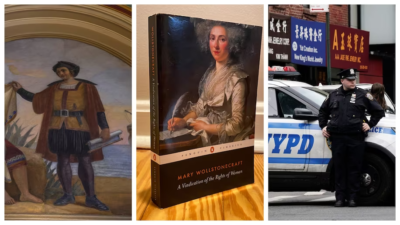 ‘Slavery was wrong’ and 5 other things some educators won’t teach anymore. By Hannah Natanson / Wash Post
‘Slavery was wrong’ and 5 other things some educators won’t teach anymore. By Hannah Natanson / Wash Post
To mollify parents and obey new state laws, teachers are cutting all sorts of lessons. Writings by Christopher Columbus and Mary Wollstonecraft and a police data set are among materials teachers have cut from their lesson plans. (Michael Robinson Chávez/The Washington Post; Hannah Natanson/The Washington Post; Bing Guan/Reuters)
The quiet censorship comes as debates over whether and how to instruct children about race, racism, U.S. history, gender identity and sexuality inflame politics and consume the nation. These fights, which have already generated at least 64 state laws reshaping what children can learn and do at school, are likely to intensify ahead of the 2024 presidential election. At the same time, an ascendant parents’ rights movement born of the pandemic is seeking — and winning — greater control over how schools select, evaluate and offer children access to both classroom lessons and library books. Read more
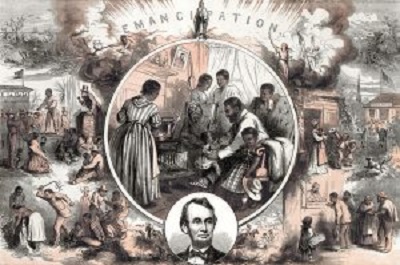 Freedom: A Documentary History of Emancipation. By Susan Schafer / Topeka and Shawanee Library
Freedom: A Documentary History of Emancipation. By Susan Schafer / Topeka and Shawanee Library
The library’s Baker Genealogy Center has a wonderful source for researching your family from Emancipation and Reconstruction through 1872. Freedom: A Documentary History of Emancipation 1861-1867 is a superb series of books you can use to research your ancestors. Within the pages you will find letters, and documents that shine light on post-Civil War America. The Freedmen’s Bureau was established to assist these people and Freedom gives you access to that time period. Here is a brief history of the Freedmen’s Bureau, and the efforts to preserve the documents and make them accessible for everyone to research. Read more
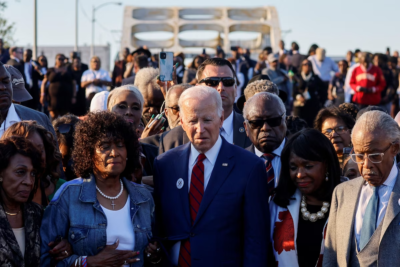 Biden recognizes ‘Bloody Sunday’ civil-rights anniversary. By Michael Collins and Rebecca Morin / USA Today
Biden recognizes ‘Bloody Sunday’ civil-rights anniversary. By Michael Collins and Rebecca Morin / USA Today
The black-and-white images that flickered across television sets from that Bloody Sunday in Selma horrified the nation.
Biden visited Selma on Sunday to mark the 58th anniversary of the march, now regarded as one of the defining moments in the nation’s civil rights movement. He delivered remarks at the Edmund Pettus Bridge and participated in the re-enactment of the bridge crossing. “We see you are fighting to make sure no one’s left behind. This is a time of choosing and we need everybody engaged,” Biden said during his remarks. Read more
Related: Biden is right about voting rights: They’re still under assault. By Eugene Robinson / Wash Post